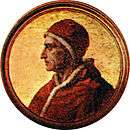1406 papal conclave
The 1406 papal conclave (November 18–30), the papal conclave of the time of the Great Western Schism, convened after the death of Pope Innocent VII. It elected Cardinal Angelo Correr, who under the name of Gregory XII became the fourth pope of the Roman Obedience.
| Papal conclave November 1406 | |
|---|---|
| Dates and location | |
| 18–30 November 1406 Rome, Papal States | |
| Key officials | |
| Dean | Angelo Acciaioli |
| Camerlengo | Corrado Carracioli |
| Protodeacon | Landolfo Maramaldo |
| Elected pope | |
| Angelo Correr Name taken: Gregory XII | |
 | |
Cardinal electors
Pope Innocent VII died on November 6, 1406. At the time of his death, there were eighteen cardinals in the Roman Obedience of the College of Cardinals. Fourteen of them participated in the election of his successor:[1]
| Elector | Title | Elevated | Elevator | Notes [2] |
|---|---|---|---|---|
| Angelo Acciaioli | Cardinal-Bishop of Ostia e Velletri | 1384, December 17 | Urban VI | Dean of the Sacred College of Cardinals; Vice-Chancellor of the Holy Roman Church; Archpriest of the patriarchal Vatican Basilica |
| Enrico Minutolo | Cardinal-Bishop of Frascati | 1389, December 18 | Boniface IX | Archpriest of the patriarchal Liberian Basilica; Camerlengo of the Sacred College of Cardinals |
| Antonio Caetani (seniore) | Cardinal-Bishop of Palestrina | 1402, February 27 | Boniface IX | Grand penitentiary; Archpriest of the patriarchal Lateran Basilica |
| Angelo d'Anna de Sommariva, O.S.B.Cam. | Cardinal-Priest of S. Pudenziana | 1384, December 17 | Urban VI | |
| Corrado Carracioli | Cardinal-Priest of S. Crisogono | 1405, June 12 | Innocent VII | Camerlengo of the Holy Roman Church; Administrator of the see of Mileto |
| Angelo Correr | Cardinal-Priest of S. Marco | 1405, June 12 | Innocent VII | Latin Patriarch of Constantinople; Administrator of the see of Coron
(elected Pope Gregory XII) |
| Giordano Orsini | Cardinal-Priest of SS. Silvestro e Martino ai Monti | 1405, June 12 | Innocent VII | Cardinal-protector of the Order of Franciscans |
| Giovanni Migliorati | Cardinal-Priest of S. Croce in Gerusalemme | 1405, June 12 | Innocent VII (Cardinal-nephew) | |
| Antonio Calvi | Cardinal-Priest S. Prassede | 1405, June 12 | Innocent VII | |
| Landolfo Maramaldo | Cardinal-Deacon of S. Nicola in Carcere Tulliano | 1381, December 21 | Urban VI | Protodeacon of the Sacred College of Cardinals; Legate in Perugia |
| Rinaldo Brancaccio | Cardinal-Deacon of SS. Vito e Modesto | 1384, December 17 | Urban VI | |
| Oddone Colonna | Cardinal-Deacon of S. Giorgio in Velabro | 1405, June 12 | Innocent VII | Bishop-elect of Urbino |
| Pietro Stefaneschi | Cardinal-Deacon of S. Angelo in Pescheria | 1405, June 12 | Innocent VII | |
| Jean Gilles | Cardinal-Deacon of SS. Cosma e Damiano | 1405, June 12 | Innocent VII |
All the electors were Italians, except of Jean Gilles, who was French. Four of them were elevated by Urban VI, two by Boniface IX, and eight by Innocent VII.
Absentee cardinals
Four cardinals, one created by Urban VI, one by Boniface IX and two by Innocent VII, did not participate in this conclave:[1]
| Elector | Title | Elevated | Elevator | Notes [2] |
|---|---|---|---|---|
| Bálint Alsáni | Cardinal-Priest of S. Sabina | 1384, December 17 | Urban VI | Archpriest of the Sacred College of Cardinals; Administrator of Pécs |
| Francesco Uguccione | Cardinal-Priest of SS. IV Coronati | 1405, June 12 | Innocent VII | Administrator of Bordeaux |
| Pietro Filargo of Candia, O.F.M. | Cardinal-Priest of SS. XII Apostoli | 1405, June 12 | Innocent VII | Administrator of Milan |
| Baldassare Cossa | Cardinal-Deacon S. Eustachio | 1402, February 27 | Boniface IX | Legate in Romagna and Bologna |
The election of Pope Gregory XII
Fourteen cardinals present in Rome entered the conclave in Vatican[3] on November 18, twelve days after the death of Innocent VII.
Initially, all the electors subscribed the conclave capitulation,[3] in which each of them swore that, if elected, he would abdicate provided Antipope Benedict XIII did the same or should die; also, that he would not create new cardinals except to maintain parity of members with the Avignon cardinals; and that within three months he would enter into negotiations with his rival about a place of meeting.[4]
Almost no further details about this conclave are known, except of its final result. On November 30 Cardinal Angelo Correr, proposed by Cardinal Caetani, was unanimously[5] elected Pope, in spite of his very advanced age (probably ca. 80). He accepted his election and took the name of Gregory XII. Although he claimed the legality of his pontificate, nine years later he abdicated in the Council of Constance, making possible to restore the unity of the Roman Catholic Church.
Notes
- Miranda, Salvador. "Conclave of November 18 - 30, 1406 (Gregory XII)". The Cardinals of the Holy Roman Church. Florida International University.
- Notes according to the biographical entries of the respective cardinals on Essay of a General List of Cardinals by Salvador Miranda
- Vatican History: Konklave 1406 Archived 2007-09-27 at the Wayback Machine
- John Kelly, The Oxford Dictionary of Popes, Oxford 1986, p. 235
- The Catholic Encyclopedia: Pope Gregory XII